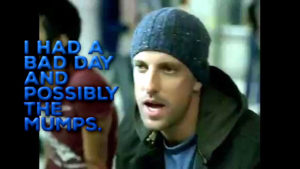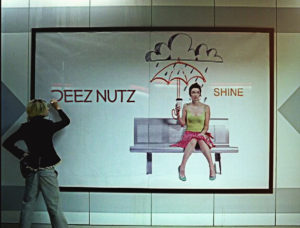 If you are still on Facebook (…and you are still on Facebook — no one believed your grandiloquent “Bye, Felicia” moment), you’ll recall a few weeks ago when every one of your friends posted a link to an article about Starship’s “We Built This City.” The oral history crowned the song the worst of all time, and used testimony from some of the songmakers themselves as evidence. Almost immediately the Internet erupted with rejoinders and rebuttals, all claiming, “No, THIS is the worst song of all time.” This is one of those.
If you are still on Facebook (…and you are still on Facebook — no one believed your grandiloquent “Bye, Felicia” moment), you’ll recall a few weeks ago when every one of your friends posted a link to an article about Starship’s “We Built This City.” The oral history crowned the song the worst of all time, and used testimony from some of the songmakers themselves as evidence. Almost immediately the Internet erupted with rejoinders and rebuttals, all claiming, “No, THIS is the worst song of all time.” This is one of those.
In my mind, a song must commit three sins in order to be the worst. The infernal criteria are: it must be trite, repetitious, and chief among these, it must be lazy. Songs aren’t necessarily bad because of the first two accusations. “All You Need Is love” is kind of trite when you think about it. “We Shall Overcome” is pretty repetitious. No one could argue both aren’t powerful statements, so it is the combination of these AND laziness that tips the scale.
Based on this, “We Built This City” ends up surviving well. The chorus is kind of repetitious, but one never gets the feeling they’re listening to a loop, per se. The word salad of lyrics may be naive but I can’t call it trite. And shockingly, little about the song is outright lazy. People seemingly worked really hard on this, which might be horrifying but doesn’t condemn the accused to “very worst” status.
 Are there contenders for “worst song” in mind? Indeed, but actually assigning blame it tough once you apply that three sins doctrine. Hoobastank should probably win based solely on their having named the band Hoobastank. “The Reason” is exceedingly trite and rather lazy in that it takes the hoary premise of “I love you, baby, you give my life purpose” and does zippo-zilch-double-dog-nuts with it. The opening line, “I’m not a perfect person” is an invitation to slip on the brass knuckles. However, except for the bridge of “And the reason is YO! And the reason is YO!,” the track is competently composed with minimal obvious repetition. (I know it is “you” but lead singer Douglas Robb continually pronounces it “yo.” 19 demerits.) This does not excuse the song. It runs through the usual major chords without earning the glory major chords tend to represent.
Are there contenders for “worst song” in mind? Indeed, but actually assigning blame it tough once you apply that three sins doctrine. Hoobastank should probably win based solely on their having named the band Hoobastank. “The Reason” is exceedingly trite and rather lazy in that it takes the hoary premise of “I love you, baby, you give my life purpose” and does zippo-zilch-double-dog-nuts with it. The opening line, “I’m not a perfect person” is an invitation to slip on the brass knuckles. However, except for the bridge of “And the reason is YO! And the reason is YO!,” the track is competently composed with minimal obvious repetition. (I know it is “you” but lead singer Douglas Robb continually pronounces it “yo.” 19 demerits.) This does not excuse the song. It runs through the usual major chords without earning the glory major chords tend to represent.
 Rachel Platten’s “Fight Song” is kind of repetitious, but not demonstrably so. It isn’t necessarily trite, as the central theme of “I’m a fighter and I don’t need you” is much more lazy than anything else. From the fact that Platten’s song is blatantly cribbed from antecedents Christina Aguilera and Kelly Clarkson, this is a by-the-numbers, you-go-girl, gonna-rise-up anthem that never stirs anthemically and never poses a credible challenge to those the song purportedly pays homage to. More than that, it is dull and easily parodied. To wit: “This is my fight song, it really bites song, musical blight so-ong.” I JUST MADE THAT UP FROM NOTHING RIGHT NOW! And yet all three points of contention are not sufficiently represented so, no, “Fight Song” cannot honestly be considered the very worst of the worst.
Rachel Platten’s “Fight Song” is kind of repetitious, but not demonstrably so. It isn’t necessarily trite, as the central theme of “I’m a fighter and I don’t need you” is much more lazy than anything else. From the fact that Platten’s song is blatantly cribbed from antecedents Christina Aguilera and Kelly Clarkson, this is a by-the-numbers, you-go-girl, gonna-rise-up anthem that never stirs anthemically and never poses a credible challenge to those the song purportedly pays homage to. More than that, it is dull and easily parodied. To wit: “This is my fight song, it really bites song, musical blight so-ong.” I JUST MADE THAT UP FROM NOTHING RIGHT NOW! And yet all three points of contention are not sufficiently represented so, no, “Fight Song” cannot honestly be considered the very worst of the worst.
So I nominate Daniel Powter’s “Bad Day,” but not Powter himself. He only sang it and does the very best he can with it. It took three guys — Asher Paul Roth, Oren Yoel Kleinman, and David Anthony Appleton — to strike the match to light this fart on fire. In this, the song mirrors “We Built This City” which went through several revisions and wound up being written more by committee.
“Bad Day” is exceedingly trite, essentially imploring you to “go do stuff if you had a bad day to go forget you had a bad day.” Simple enough. So simple a simple simpleton could do it. Fake it ’til you make it. Stuff happens. Kick some leaves. Whatever.
The song had the misfortune (for us) of arriving not too far apart from James Blunt’s “You’re Beautiful” which could have rivaled “Bad Day” for top spot, except that the former is not all that repetitious. Give Blunt credit for shoveling on the steaming awfulness, but at least there’s differentiation between each shovelful. This is how “Bad Day” finishes up:
‘Cause you had a bad day
You’re taking one down
You sing a sad song just to turn it around
You say you don’t know
You tell me don’t lie
You work at a smile and you go for a ride
You had a bad day
You’ve seen what you like
And how does it feel for one more time
You had a bad day
You had a bad day
Had a bad day
Awwww-eee-ooo
Had a bad day
Awwww-eee-ooo
Had a bad day
Awwww-eee-ooo
Had a bad day
Awwww-eee-ooo
Had a bad day
 The chord progression throughout the song is a lazy, prolonged thudding, like a one-legged drunken deer stumbling across an L.A. freeway. Because of that, individuals can easily hear the song in their head with all the lyrics replaced excepting “You had a bad day, You had a bad day, You had a bad day, You had a bad day” mentally amplifying the feeling of repetition. I’d also like to throw in that “Bad Day” and “The Reason” generally share major chords between them. I’m not saying “The Reason” (2003) influenced the three writers of “Bad Day” (2005) to replicate something exhibiting the same lack of lyrical, musical or emotional testosterone. I’m not saying it didn’t either. It certainly isn’t as fish-slappingly obvious with “The Reason” as it is with “Bad Day.”
The chord progression throughout the song is a lazy, prolonged thudding, like a one-legged drunken deer stumbling across an L.A. freeway. Because of that, individuals can easily hear the song in their head with all the lyrics replaced excepting “You had a bad day, You had a bad day, You had a bad day, You had a bad day” mentally amplifying the feeling of repetition. I’d also like to throw in that “Bad Day” and “The Reason” generally share major chords between them. I’m not saying “The Reason” (2003) influenced the three writers of “Bad Day” (2005) to replicate something exhibiting the same lack of lyrical, musical or emotional testosterone. I’m not saying it didn’t either. It certainly isn’t as fish-slappingly obvious with “The Reason” as it is with “Bad Day.”
At the core, “Bad Day” is a piano ballad, and piano ballads often get a bad rap for coming across a certain way: morose, overly traditional, ponderous. I’m sure Billy Joel, Elton John, Ben Folds, Joe Jackson and so many others would rightly and respectfully disagree. Writing a song on a piano doesn’t consign it to these outcomes, but the cadre of badly-written piano songs out there like “Bad Day” can give that false impression.
We should have easily been divorced from the song a long time ago, only we can’t. Consigned to the purgatorial phone on-hold queues, elevators, and waiting rooms the world over, “Bad Day” is with us constantly and, I dare say, may be with us forever. Lord, bring us a song to save us from the bad day caused by having to listen to Daniel Powter singing “Bad Day.”





Comments